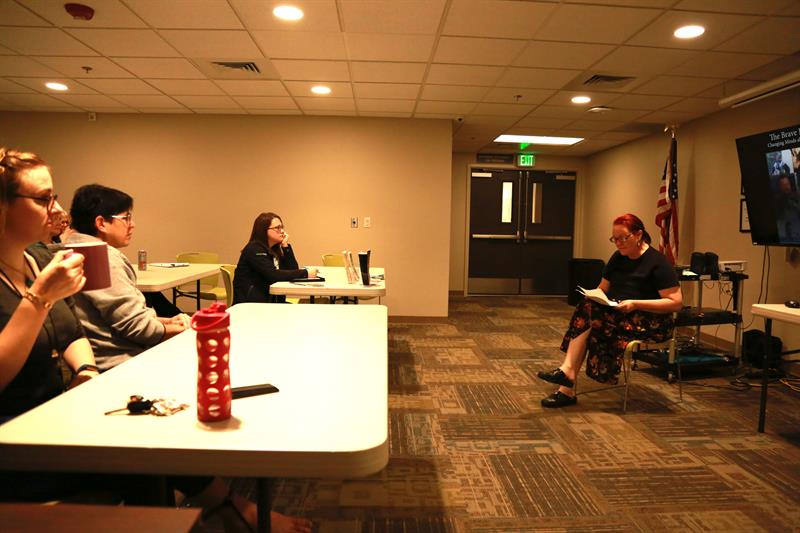March 23, 2017

Sitting in a conference room at One SAFE Place, surrounded by men and women who work every day to help people escape from domestic abuse, Carrie Diamond and Kristen McChristian stand and told their stories.
From a young age, everyone, especially women, hear the horror stories of abuse. However, many of us have not met a survivor of abuse or didn’t know that we were standing right in front of one.
“I appreciate the fact that this whole presentation brings to light the fact that we can dispel the myth around the stigma that exists in mental health,” said one OSP staff member. “I think it’s really powerful in that in both of your stories you demonstrate how you were on this journey and how, in the end, you did find hope and healing.”
Kristen McChristian, a Burney resident, knew this suffering and fear from a very young age. “I grew up in a severely abusive family. A family member abused me from age two to 12. It wasn’t just a family member, it was all of his buddies, too.” she said. “So when I became old enough to pick a man in my life, I always picked abusive men because in my head I believed I needed protection.”
McChristian and Diamond are presenters in the Brave Faces Speakers Bureau, through which they share their experiences with different mental health challenges in order to fight the stigma and ignorance about mental illnesses. In their presentations March 15, 2017, for One SAFE Place staff, they discussed the link between sexual assault and mental health problems as well as their paths to recovery.
Victims of child abuse develop adverse childhood experiences (ACEs) over time. They often self-medicate with alcohol or drugs to silence the pain. As a complication of excessive abuse, Kristen developed a personality disorder and severe post-traumatic stress disorder. She also started using drugs and alcohol to numb the pain, but now she has been clean off heroin for many years. “Today I have the tools to keep me healthy and stable,” she said.
Kristen explained she was drawn into abusive relationships as an adult. One man abused her so emotionally she wouldn’t leave the house without him. “You may ask why I stayed. Well, I was scared. I tried to leave, he would always find out where I was and then once again, I was punished, Kristen said. “I felt like I lived in a prison.”
Though the circumstances were very different, Carrie Diamond also suffered abuse and subsequent mental illness due to her service in the military.
By the time Carrie was old enough to enlist, the Clinton administration had enacted the “Don’t Ask, Don’t Tell” policy, which prohibited LGBTQ (lesbian, gay, bisexual, transgender and queer) people from disclosing their sexuality on the threat of a dishonorable discharge.
“I really felt that, as a person who identified as lesbian, that not being able to be my authentic self actually left me vulnerable to attack,” she said.
About a year after she joined, on Valentine’s Day, Carrie was sexually assaulted by another soldier. She did not report the incident immediately, partly because she was afraid that no one would believe her side of the story.
She believes that the most difficult part of military sexual trauma (MST) is the betrayal she felt from her fellow officers. “There’s no gender to it. Everyone does their job, is a soldier,” Carrie said. “So something like military sexual trauma takes that sort of comradery/family aspect out of it.”
Carrie started showing signs of post-traumatic stress disorder (PTSD) about six months after she was attacked. She finally reported her assault and was told that it did not qualify as “rape,” according to military standards. After being bounced around, she was finally sent to a support group for depression. She was the only woman there for treatment. She felt uncomfortable sharing her experiences there and stopped attending the group.
After Carrie completed her time in the military, her mental health symptoms worsened when she returned home and was living with her parents. Carrie’s mom recognized the symptoms of PTSD and took her to a doctor for treatment. “. . .I had a family that didn’t put any stigma around mental illness,” Carrie said. “They always accepted me for who I was, so I didn’t have to self-medicate. They just took me to the doctor and started to fix it.”
It took time to find the right medications, but she continued to follow her prescriptions and doses until something worked for her. Life opened up for Carrie at that point. She went back to school and tried different classes, pushing herself to learn and grow as a person. “Eventually I have become mentally well,” she said. “I always have to manage it. I’m happy to say I haven’t had suicidal thoughts in like a year and a half. Those were everyday parts of my life for a very long time.”
To have a Brave Faces speaker come share with your school, club, organization or staff meeting, contact Christopher Diamond at (530) 229-8484 or cdiamond@co.shasta.ca.us.
To learn to recognize the signs someone may be thinking about suicide, go to Know the Signs.
Share this Story

© Copyright 2021 – Stand Against Stigma – All rights reserved. | Websites By: prime42